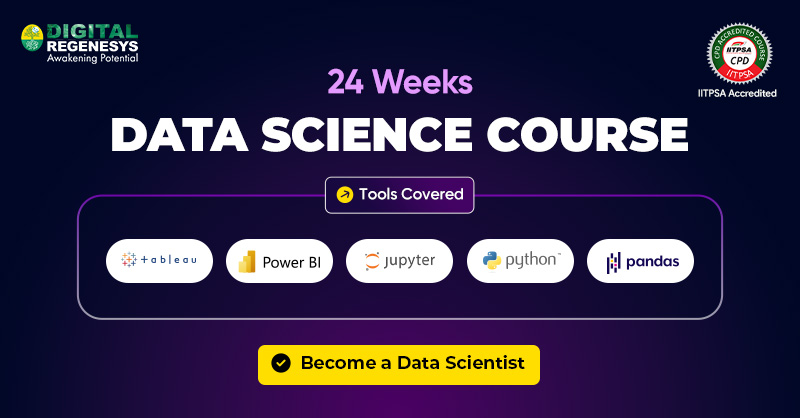What is the Difference Between Data Engineering and Data Science?

Data Science is an interdisciplinary field that uses scientific methods, processes, algorithms, and systems to extract knowledge and insights from structured and unstructured data. It combines techniques from statistics, computer science, and domain-specific knowledge to analyse and interpret complex data sets. Data scientists use tools like Python, R, and machine learning libraries to manipulate data, build models, and visualise results.
On the other hand, data engineering focuses on designing, building, and maintaining the infrastructure and systems related to collecting, storing, and processing large volumes of data. Data engineers develop strong architectures to ensure data is accessible, reliable, and ready for analysis. They work with tools like Apache Hadoop, Apache Spark, SQL, and cloud platforms. Data engineers handle tasks like data pipeline creation, ETL processes, and database optimisation, ensuring data quality and integrity.
Read the article to learn about data science vs. data engineering, their similarities, and more.
Difference Between Data Science and Data Engineering
Understanding the difference between Data Science and Data Engineering is important in today’s data-driven world. This will help you understand the exact meaning of data science and data engineering in detail. Learn more about Data Science vs Data Engineering below.
|
Data Science |
Data Engineering |
|
Primarily focuses on analysing and interpreting complex data to derive insights and make predictions. |
Concentrates on designing, building, and maintaining the infrastructure and systems that allow data to be collected, stored, and processed. |
|
It includes statistical analysis, machine learning, and predictive modelling. |
Includes data warehousing, data pipeline creation, and ETL (Extract, Transform, Load) processes. |
|
Requires knowledge of statistics, machine learning, data visualisation, and programming languages like Python and R. |
Requires skills in database management, data warehousing solutions, and programming languages like SQL, Java, and Scala. |
|
Commonly uses tools like Jupyter Notebooks, TensorFlow, and Pandas. |
Uses tools like Apache Hadoop, Apache Spark, and various ETL tools. |
|
Produces insights, predictive models, and data-driven decisions. |
Produces data pipelines, robust data architectures, and data management solutions. |
|
Works with processed and cleaned data to perform analysis and build models. |
Handles raw data, focusing on its acquisition, cleaning, and storage. |
|
Often collaborates with business analysts, stakeholders, and data engineers to understand requirements and deliver insights. |
Often collaborates with IT teams, data scientists, and database administrators to build and maintain data infrastructure. |
|
It aims to find patterns, make predictions, and drive strategic decisions. |
It aims to ensure data is reliable, accessible, and efficiently processed for analysis. |
|
It includes data cleaning and preparation but mainly focuses on analysis. |
Includes extensive data cleaning, preparation, and ensuring data quality. |
|
Opportunities in the field of Data Scientist, Machine Learning Engineer, or Data Analyst. |
Opportunities in the field of Data Engineer, Big Data Engineer, or Data Architect. |

What is Data Science?
Data Science is an interdisciplinary field that uses scientific methods, processes, algorithms, and systems to extract knowledge and insights from structured and unstructured data. It is applied in various industries, including finance, healthcare, marketing, and technology. Learn more about data science from the below points.
- Data Science combines various techniques from statistics, computer science, and domain-specific knowledge to analyse and interpret complex data sets.
- Its primary goal is to find patterns, generate insights, and support decision-making processes.
- Data scientists manipulate data, create models, and visualise results using various tools and programming languages like Python, R, SQL, and machine learning libraries.
- The data science workflow includes several key steps: data collection, data cleaning and preprocessing, exploratory data analysis, model building, evaluation, and deployment.
- One of the core aspects of data science is machine learning, where algorithms learn from data to make predictions or decisions without being explicitly programmed.
- Data visualisation is another crucial component, enabling data scientists to present their findings in an accessible and understandable manner.
Read More – What is Data Science?- Know Why It is Important in Business!
What is Data Engineering?
Data Engineering is an important discipline within the data ecosystem. It focuses on designing, building, and maintaining the infrastructure and systems. Learn more about Data Engineering below.
- Data engineers develop strong architectures that ensure data is accessible, reliable, and ready for analysis by data scientists and analysts.
- Data engineers’ primary responsibilities include creating and managing data pipelines, implementing ETL (Extract, Transform, Load) processes, and optimising databases and data warehouses for performance and scalability.
- They work with various tools and technologies, such as Apache Hadoop, Apache Spark, SQL, NoSQL databases and cloud platforms like AWS, Google Cloud, and Azure.
- They clean and preprocess raw data, handle missing values, and ensure data integrity in different sources.
- Data engineers also focus on the security aspects of data management and ensure that data is protected and handled according to regulatory requirements.
Read More – What Does A Data Engineer Do- Everything You Should Know!
Similarity Between Data Science and Data Engineering
There might be differences between Data Science and Data Engineering, but they also share several similarities. Both disciplines include working with large datasets and require strong programming skills to handle and manipulate data effectively. They both emphasise ensuring data quality and reliability, which are essential for deriving accurate insights and making informed decisions. Learn more about the similarities between Data Science and Data Engineering below.
- Both fields involve working with large datasets. Data scientists analyse data, while data engineers ensure that data is collected, stored, and processed efficiently.
- Both require strong programming skills, often in languages such as Python, SQL and sometimes Java or Scala.
- Ensuring data quality is important in both disciplines. Data engineers clean and preprocess data, while data scientists also need clean data for accurate analysis and modelling.
- Data scientists and data engineers frequently collaborate. Engineers build the data infrastructure, and scientists use it to analyse data and derive insights.
- Both roles require strong analytical thinking to understand data patterns, troubleshoot issues, and make data-driven decisions.
- Both fields use similar tools and technologies, such as databases (SQL, NoSQL), big data platforms (Hadoop, Spark), and cloud services (AWS, Google Cloud, Azure).
- Both data scientists and data engineers work on integrating data from various sources to create a comprehensive dataset for analysis.
- Data transformation is a shared task. Data engineers transform raw data into usable formats, while data scientists often further transform data for specific analyses or models.
- Both roles require strong problem-solving skills to address data-related challenges, whether it’s optimising a data pipeline or tweaking a machine-learning model.
- Both disciplines aim to leverage data to support business objectives. Data engineers provide the infrastructure and tools, and data scientists extract actionable insights to inform decision-making.
Understanding Data Science vs Data Engineering is important in today’s data-driven world. Data Science analyses and interprets complex data to derive insights and support decision-making processes. On the other hand, Data Engineers design, build, and maintain the infrastructure and systems required to collect, store, and process large volumes of data. To further your understanding and skills in these fields, you can join the Digital Regenesys Data Science course. After completing the Data Science course, you will develop all the skills necessary in this field. Digital Regenesys will help you become proficient in data science and engineering, opening several career opportunities in various industries.
Last Updated: 30 September 2025
